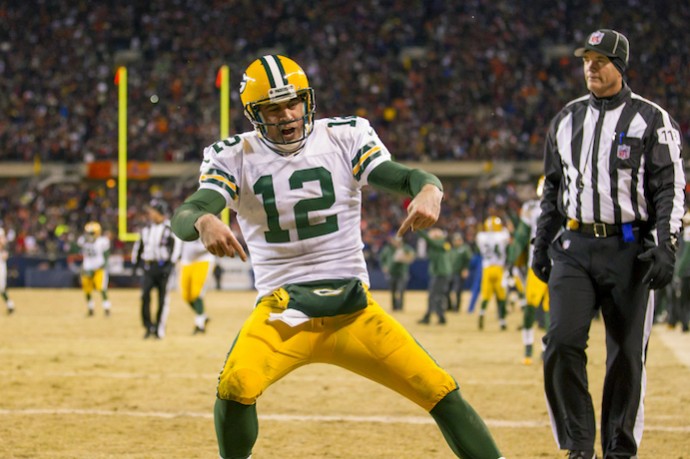After leading his team to victory over the Seattle Seahawks last Sunday, Green Bay Packers quarterback Aaron Rodgers told reporters that God “was a Packers fan tonight”—a retort to Russell Wilson’s comment that God had “set up” the Seahawks’ win over the Packers in the NFC Championship game nine months ago.
The back-and-forth (if one that allows nine months to respond can rightly use the term) elicits eye-rolling from most serious sports fans and consternation from some of the more theologically minded. To most, it looks like another case of athletes enlisting God for their own, very secular purpose; another reason to reject God or professional sports, or both.
And if this kind of God-talk provokes the Nation‘s Dave Zirin to agitate for the removal of a politicized God from football, there are plenty of David Frenches out there to vociferously reject that, thus creating another back-in-forth in the media. But if we resist the urge to untangle God from the performative quality of verbal sparring between professional athletes, we may find something about the mentality of one-upsmanship in sports and something that is theologically interesting. Perhaps even more interesting than @NFLJesus who has, to date, nearly twenty thousand followers.
The game that prompted Wilson’s original comments, back in late January 2015, was a wild one. The Seahawks were down to Rodgers’ Packers for almost the entire game (16-0 at one point), largely due to Wilson’s 4 interceptions. A furious comeback, marked most memorably by a fluky mishap on a fluky play, led to the Seahawks victory in overtime.
Wilson’s explanation of his Jekyll-and-Hyde performance relied not on something he did or did not do, nor was his God there merely to give him “the strength to endure” the trial of the first 55 minutes of the 60 minute game. Instead, it was “God setting it up, to make it so dramatic, so rewarding, so special.” Reminiscent of the biblical story of Job, Wilson’s God intentionally made things difficult for most of the game only to guide Seattle to the improbable win—all as a test of the main character (Wilson), and presumably for the sake of a dramatic ending.
While he may practice silence when it comes to expressing his Christian faith, it’s no surprise that Rodgers would take issue with any explanation of the Seahawks victory that was verbose and/or strayed from the facts of the game. Ask diehard fans, much less a participating athlete and you’ll find that the less the victorious party says after a stinging loss in a consequential game, the better.
So for Wilson to enlist God as the puppet master for the entire game indicts the Packers’ good play as much as it sanctifies everything the Seahawks did—good and bad. Unbeknownst to Rodgers (and the rest of us), all of the Packers effort for 90% of the game was in the service of an 11th hour drama—just as the holy screenwriter drew it up.
Two days after the NFC Championship, Rodgers countered Wilson’s theology by quipping, “I don’t think God cares a whole lot about the outcome. He cares about the people involved, but I don’t think he’s a big football fan.” We can read this rejoinder as a classic minimization of the opposing teams’ skill and a maximization of “we had it in the bag and let it slip away.”
Rodgers’ God wouldn’t/couldn’t care enough about football to engineer a victory, much less turn the tables on the “more-deserving” team with lucky bounces on special teams plays. God puts order into chaos and most certainly does not lodge the latter into the midst of order to create the kind of drama that results in a team and its fans being the punchline of a cruel joke.
But after this past Sunday night’s game, apparently God is once again a football fan, and a partisan one at that. Even if we agree with Zirin that Rodgers’ comments were tongue-in-cheek, he didn’t have to make this comment at all. What likely encouraged it, aside from good old retribution, was the type of game that these two teams played. It lacked late-stage drama (though the Packers did come back), game-changing luck, and late-season consequence.
What the game did possess was the kind of order and stability that permitted Rodgers to inject his God into it. The God that rewards hard work, not magic; is reliable, not capricious; and honors skill, not chance is the one that was the Packers’ fan on Sunday night, according to Rodgers. Or at least this is the God who can be used to rebuke bad theologies given at bad times by the opposing team. We can only hope that Wilson’s God will rear its head during their next matchup because if God is still a Packers’ fan, then the game may be more informative than the Bible.





